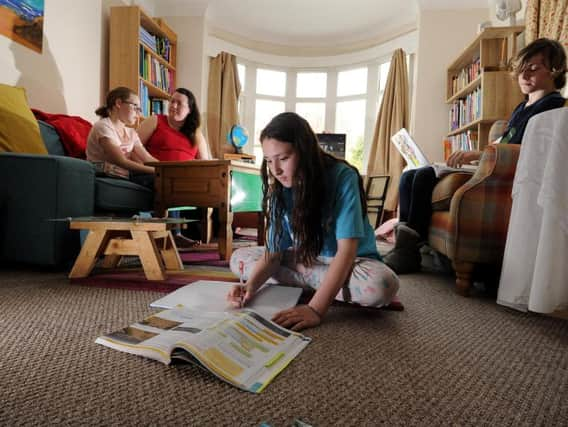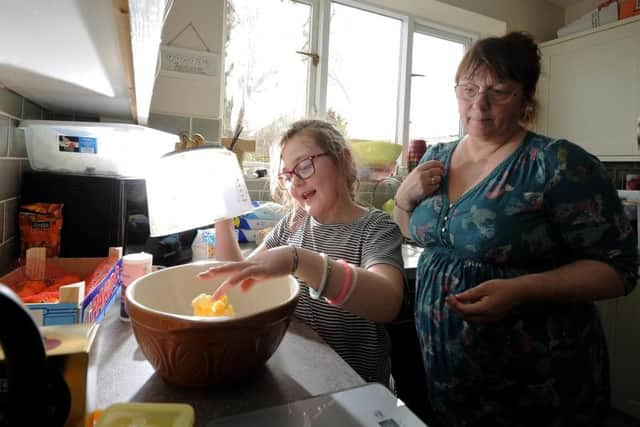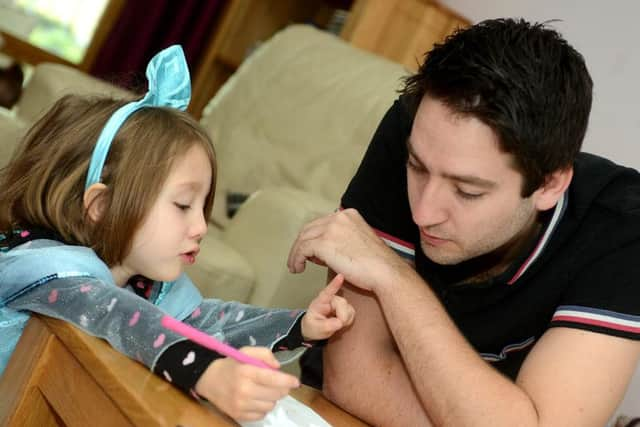Home education: The vastly different reasons why families 'choose' it


It has just gone 1pm when I arrive at Chelle Oldham’s household on the outskirts of Scarborough on a Tuesday afternoon. At nearby Scalby school, lunchtime is just beginning for one group of students and it is back to lessons for the afternoon for another. For Chelle’s four children though, there is no such structure. Each of them is home educated – and they are free to learn at whatever time they like.
Fifteen-year-old Jack and his sister Elizabeth, 12, are studying geography when I enter, preparing for a field trip to Malham for home schooled children later that week. Their younger sister Eleanor, 11, is also working from a textbook, though a Monopoly board, set up mid-way through a game, sits next to her and I am told all four of them began play that morning and that it supports their maths and strategy skills.
Advertisement
Hide AdAdvertisement
Hide AdThe youngest, Emily, nine, is keen to show me a new workbench in the garage, set up for her outdoors projects. With Stacey Smith, the children’s nanny since September, she tends to the strawberry plants she is growing in the garden, before leading me inside to the kitchen, where they spend part of the afternoon baking.


As they get underway, Chelle tells me about notebooking – a technique Emily has been using since January. She begins studying a topic of her own choosing and finds out all she can about anything related to it, logging information down in booklets. Emily breaks off and runs to collect them for me, thumbing through the pages with enthusiasm, as she passes by work on everything from pandas to the sea.
Though all the children have attended school at some point, Emily has spent the least amount of time in that environment. “I struggle to see how she would be successful in that system,” Chelle tells me. “She’s really creative, she dances about, she loves being outside in all weathers.” To put her in the four walls of a classroom for six hours a day would be “so wrong”, she says.
Giving children a choice
“Because there’s four of them, it’s not just a choice as to whether or not they go to school, it’s a choice as to how they want to learn and that’s been the philosophy from the very beginning.
Advertisement
Hide AdAdvertisement
Hide Ad

The whole idea is if it is their choice, they will learn better. If it’s them naturally choosing the method by which they want to take on information and investigate things and be curious about things, then they will retain it.”
“Unfortunately, in school, there’s no space for teachers to be able to allow 30 children in front of them to decide for themselves how they want to learn that topic,” she adds. “Whereas in a home environment, even if we meet up with other home educated children, there’s that space for them to be able to continue with a topic for as long or short a time as they want to – and revisit it at anytime.”
Chelle, who trains teachers at Coventry University’s Scarborough campus, has always given her children a choice about whether or not they attend school – though she asks them to justify their decision. All four have been educated at home together since November 2017. “It’s not my education, I’ve done mine,” she says. “It’s theirs and so they need to have a say in that. They need to have some active role in what they think is best to a certain extent.”
Jack, who plans to go to York College in September to do a course in public services, most recently moved out of school at age 14. He tells me he felt that the social side “overtook” work. “I think being smart in school is not good,” he says. “The smarter you are in school, the more likely you are to be pushed aside, be bullied, to be picked on... to a point where it’s not cool to be smart.”
Home education community
Advertisement
Hide AdAdvertisement
Hide AdAt home, the children have access to resources including educational shows on television, books, audio stories and craft, gardening and cooking materials. Together, the family, who are initially from Huddersfield and spent time living on a farm in Scotland, find events and courses to attend nearby, including a Science, Maths, Technology and Engineering programme the children have recently taken part in, sign language and pottery classes, museum activities and forest school. Involved in home education groups, they also have study days with other children and take part in organised day trips across Yorkshire.
“They’re meeting far more children from different backgrounds and places than they would if they were to go into a school here with 300 other children in it,” Chelle says. “I think that’s difficult for people to get their head around, because they think if children are home-schooled, they must be sat in the house five, six, seven days a week, when actually it’s quite difficult to get mine to have a down day because there’s so many different things.”
'No pressure'
Chelle, who has been involved in various education reviews, is encouraging the children to take their English, maths and science GCSEs but, when it comes to exams and qualifications, there’s no pressure. They only take what they want to – and not necessarily at the age they would in school, and they have input into what they want to learn and what times of the day they want to do so, overseen by Chelle, Stacey or their father Pete Davison.
It is this child-led learning element of home education that inspired Wakefield mum Sophie Mei Lan Hale and her husband Chris to give it a try with their daughter Jasmine, then four, before deciding whether she would attend school. “I think child-led learning is very powerful – going with what is right for them at that time,” she says. “We accept school but we should be questioning whether it is the right thing, particularly given the pressures on schools and pupils.”
Advertisement
Hide AdAdvertisement
Hide AdJasmine, now seven, does now attend but Sophie says the family will keep an open mind with education, including for younger daughter Arianna, four, who is due to start in September. “If at some point in school life, I believe she is unhappy and it isn’t for the best, then we will re-evaluate again,” she says.
'Warped' concept
According to a report published by the Children’s Commissioner in February, the number of children in England being home schooled at any one time in 2018 stood at around 60,000 and has risen by 20 per cent in each of the last five years, doubling since 2013/14.
But unlike Chelle and Sophie, not every parent is home educating by choice. Some feel they are forced to – and cite their child being bullied, a lack of support for additional or specialist needs, and feeling pressured by the school, as being among reasons for doing so.
In a letter to the Public Accounts Committee in October last year, Ofsted Chief Inspector Amanda Spielman said the concept of home education was “being warped”. Setting out one concern, she wrote: “We have a lot of anecdotal evidence that suggests that parents are home-educating their children under duress, to prevent exclusion.”
Advertisement
Hide AdAdvertisement
Hide AdThe concern was echoed a month later, with the publication of The Association of Directors of Children’s Services’ latest Elective Home Education Survey. It said that local authorities were worried about home schooling being presented to parents as an option to avoid exclusion or fines, “especially where a child has complex and overlapping health and social care needs”.
In January, the issue was highlighted once again, when the annual report of the Chief Schools Adjudicator for England said that reasons parents had given to local authorities for choosing to home educate their children included seeking to avoid a potential exclusion of their child or a prosecution for poor attendance, concerns that special educational needs were not being met and the failure to secure a place at their preferred school.
Regarding the former, it said: “Local authorities were clearly worried that many of these children were unlikely to receive sufficient education at home and that any existing problems were likely to be exacerbated.”
Off-rolling
Only last week, a House of Commons briefing paper noted how parents may be encouraged to home educate a child where they would not otherwise have chosen to do so, as part of a practice known as off-rolling.
Advertisement
Hide AdAdvertisement
Hide AdThe procedure, deemed “unacceptable” by the Government, sees children removed from the school roll for reasons including to relieve financial pressure, boost overall performance or because schools are struggling to provide additional support.
In her February report, Skipping School: Invisible Children, Children’s Commissioner Anne Longfield, who grew up in the Yorkshire market town of Otley, said: “Many parents who make a philosophical decision to home educate put a substantial amount of thought and dedication into providing their children with a high quality education.
“But there are many other families out there who have ended up home educating for other reasons, and are struggling to cope. There needs to be a cultural shift away from pressurised, hot-housing schools, to help stem the tide of children entering home education when it is not in the family’s true interests or wishes.”
She called for a requirement for all parents who are home educating to register their children with the local authority, a suggestion that has been criticised as unnecessary intervention by some families who have chosen to home school.
Advertisement
Hide AdAdvertisement
Hide Ad“What I would say to them is it’s not really a register that has been suggested for their purposes,” she says, when I put their concerns to her.
“But actually there are children whose best interests aren’t being met by being educated at home, whose parents haven’t made that as a first choice, whose parents aren’t able to give them the educational support that they need. And there will be some families who are going under the radar to be able to disappear from view. It’s those children I think we need a much better way of capturing, in terms of their wellbeing.”
A change of phrase?
Back in Scarborough, Chelle is not opposed to a register listing children’s details, though she believes it unnecessary, but says there would be “huge concern” if power was given to local authorities to scrutinise education.
She suggests the only way such monitoring could “successfully” be done is through the home education community itself, making use of the skills of the many teachers who choose to school their own children at home.
Advertisement
Hide AdAdvertisement
Hide AdAs for parents feeling ‘forced’ into home educating, “it’s horrific”, she says and tells me the book lies with the Government for pressures in the education system. “I do not think that in 2019, in England, parents should be in a position where they do not feel they have a choice over the education of their children.”
It is clear that the experience of Chelle and her children is a far cry from some of the stories highlighted in the recent reports – and perhaps a change in labelling would be useful. As the commissioner points out: “It’s a really unhelpful collection of different scenarios that gets put under the one banner of home education.” In Yorkshire, as with elsewhere, it certainly seems that way.
Government guidance
Following a consultation last year, updated guidance on home education for families and local authorities was published by the Government in April.
It also launched a consultation, until June 24, on proposed legislation concerning children not in school, including the launch of a new register of children not in a state-funded or independent school and a duty on local authorities to provide support to home educated families if requested.
Advertisement
Hide AdAdvertisement
Hide AdThe Government said it intends to move towards a position where authorities are better able to take action to ensure a child is receiving suitable education.
But it says the current proposals do not include powers for them to monitor the suitability of home schooling.